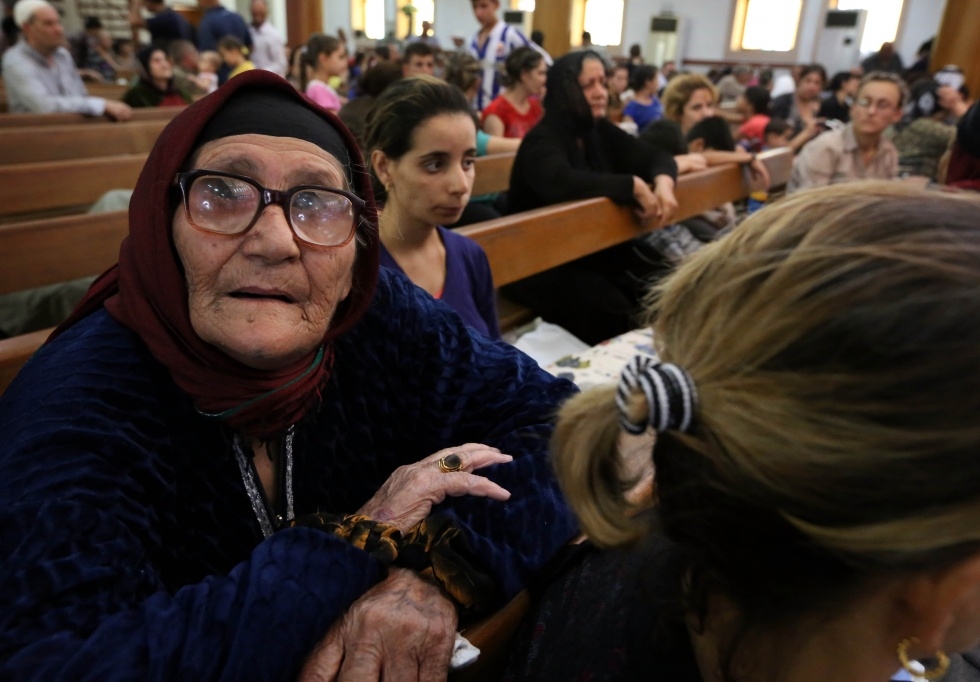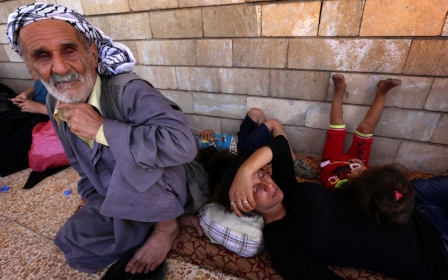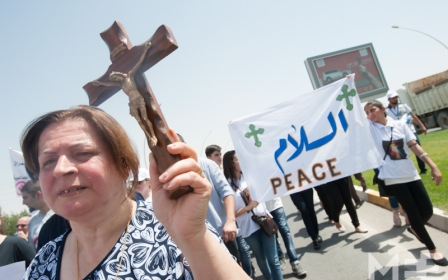Islamic State makes gains in Iraq as Christians flee north

Islamic State (IS) fighters launched a fresh offensive on Thursday, capturing Iraq's largest Christian town Qaraqosh, and sending tens of thousands feeling north as violence continued to grip the country.
IS militants moved into Qaraqosh and other towns overnight, after the withdrawal of Kurdish Peshmerga troops, which are stretched thin across several fronts, residents said.
Qaraqosh, Iraq's largest Christian city was seized by IS in the early hours of the morning, as 50,000 residents have reportedly fled the city.
Many resident of surrounding towns such as Bartella and Tel Kayf have begun to flee as well, in fear their city will fall next.
Middle East Eye reporters, who had tried to gain access to the town early this morning, were turned away by Kurdish forces who told them that IS was now in control of the area.
“This morning at least a thousand cars were lined up at the Iraqi Kurdistan border, waiting at the checkpoint to enter the relative safety of Iraq's Kurdish Autonomous region,” MEE reporter Sheren Khalel said.
“People, arrived at the checkpoint on foot, lined the road under the baking sun, sitting on the few belongings they were able to drag as they fled. Some literally only had the clothes on their backs.”
Khazir, the UNHCR camp near the checkpoint had already reached capacity as thousands more internally displaces, continued to pour north.
"Qaraqosh, Tal Kayf, Bartella and Karamlesh have been emptied of their original population and are now under the control of the militants," Joseph Thomas, the Chaldean Catholic archbishop of Kirkuk and Sulaimaniyah, told AFP.
Violence also gripped other parts of the country, with a car bomb ripped through a Shiite mosque in the Kurdish-controlled Iraqi city of Kirkuk on Thursday, killing seven and wounding 37, according to local medical sources.
The capital Baghdad was similarly rocked by a series of bomb blasts late on Wednesday that killed 51 people in predominantly Shiite neighbourhoods.
UN meets on crisis
The latest escalation has prompted France to call for an emergency UN Security Council meeting on the issue. A closed door meeting is now expected to take place later today.
"France is very deeply concerned by the latest advances of [IS militants] in the north of Iraq and the taking of Qaraqosh, the biggest Christian city in Iraq, as well as by the intolerable abuses that were committed," France’s foreign minister, Laurent Fabius said in a statement.
"Given the seriousness of the situation - the first victims of which are civilians and religious minorities - France is requesting an urgent meeting of the Security Council so the international community can mobilise to counter the terrorist threat in Iraq and support and protect the population at risk."
Qaraqosh lies between Mosul, where IS has its key Iraq base, and Erbil, the Kurdish region's capital. It usually has a population of around 50,000.
Tal Kayf, the home of a significant Christian community as well as members of the Shabak Shiite minority, also emptied overnight.
Chaldean Patriarch Louis Sako, who heads Iraq's largest Christian denomination, said the overnight offensive had displaced 100,000 Christians, although these numbers have not been independently verified.
"Tal Kayf is now in the hands of the Islamic State. They faced no resistance and rolled in just after midnight," Boutros Sargon, a resident who fled and was reached by phone in Erbil, told AFP.
"I heard some gunshots last night and, when I looked outside, I saw a military convoy from the Islamic State... shouting 'Allahu Akbar' (God is greatest)."
Pope Francis urged the international community to protect Iraq's Christians.
Toby Dodge, director of the Middle East Centre at the London School of Economics, said he wasn’t surprised by the IS drift northwards.
“It was always a mystery why they [IS] went south,” Dodge said. “They are opportunistic. They pushed as far south as they could and now they’ve redoubled their efforts and pushing north and northwest.”
Without a militia, the community in Sinjar is one of the most vulnerable in Iraq, and an easy target as IS continues an advance which says more about the weakness of the Iraqi state than the power of the group, he said.
Estimates released on Thursday indicate that the group has swollen to around 20,000, likely including many opportunists who have joined up because the group is “at the cutting edge as it were,” Dodge said.
Even if Iraqi Prime Minister Nuri al-Maliki is replaced, as looks increasingly probable, rebuilding the state will be tricky and IS’s exploitation of the country’s weaknesses is likely to continue, he said.
The news of the IS offensive comes just days after the militant group began a crackdown on Iraq's Yazidi population, sending tens of thousands fleeing into the mountains. According to Iraqi officials, some 500 Yazidis have been killed in the offensive during the last week.
Up to 800 Yazidis are believed to have made it to Turkey on Thursday.
"They have been accommodated by the local authorities in a housing complex for earthquake victims in the town of Silopi near the Iraqi border," a government source told AFP on the condition of anonymity.
New MEE newsletter: Jerusalem Dispatch
Sign up to get the latest insights and analysis on Israel-Palestine, alongside Turkey Unpacked and other MEE newsletters
Middle East Eye delivers independent and unrivalled coverage and analysis of the Middle East, North Africa and beyond. To learn more about republishing this content and the associated fees, please fill out this form. More about MEE can be found here.




